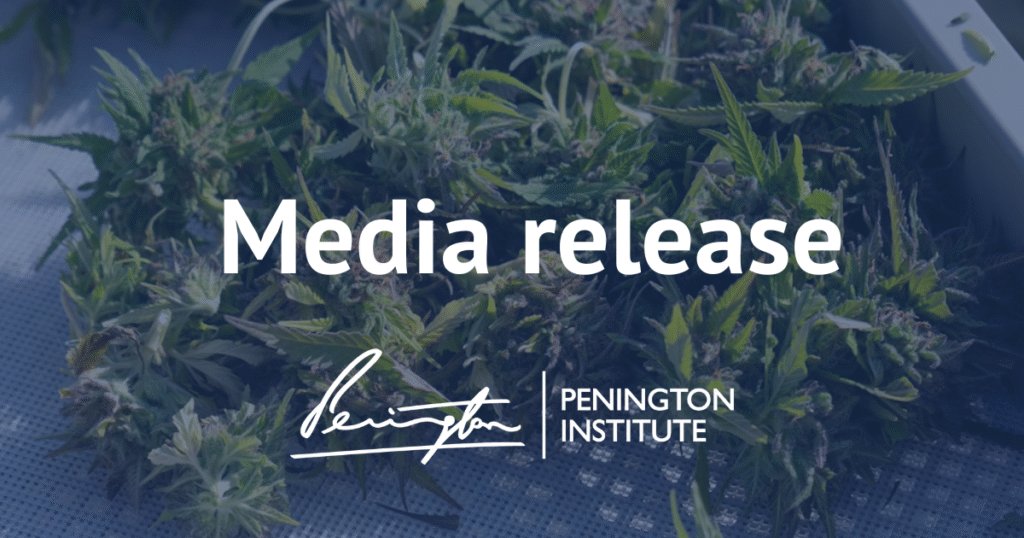
Victoria risks missing a golden opportunity to generate billions in additional revenue, create tens of thousands of jobs, and reinvigorate rural and regional economies, if it doesn’t act to legalise and regulate cannabis.
New economic modelling by Sapere Research Group, commissioned by Penington Institute, reveals a regulated adult-use cannabis market would inject $10 billion into Victoria’s gross state product over the next decade, and generate nearly $2 billion in new government revenue through cannabis-specific fees and increased revenue from payroll tax.
Common-sense cannabis legalisation would also deny crime gangs a key income stream while also freeing up police resources to focus on more serious crime.
Using the Sapare figures, it’s further estimated that if Victoria had embraced this reform 30 years ago (when first considered by then Liberal Premier Jeff Kennett) the state would have already generated over $4 billion in additional fees and taxes. If Premier Daniel Andrews had embraced cannabis reform in his first term, Victoria would have generated more than $2 billion in additional government revenue by now.
That’s money that could have gone into health, law enforcement, housing or regional infrastructure. We know ditching prohibition and embracing cannabis regulation is the right thing to do, and that Victorians strongly support this change. Now we have the hard data detailing what an absolute economic boon cannabis reform would be.
John Ryan, Penington Institute CEO Tweet
Penington Institute has developed a comprehensive regulatory plan to guide the proposed legalisation of cannabis in Australia. The plan includes 21 distinct control measures, including a complete ban on underage consumption, cannabis advertising and public use, and strict rules governing the production, distribution and legal sale of cannabis. Under this approach, state governments would collect license fees and other regulatory charges.
Sapere’s analysis found that if a similar control model was implemented in Victoria:
Ten years into a regulated market, annual government revenue from cannabis would hit $316 million. That’s roughly 1% of Victoria’s current total tax take.
More than 17,000 full-time equivalent jobs would be created across the economy.
The legal cannabis industry would generate $18 billion in direct and flow-on economic activity over a decade.
Crucially, the report finds that most of the economic benefit would go to rural and regional Victoria.
Cannabis regulation provides a new economic growth opportunity for Victoria.
Victoria’s current approach to cannabis — prohibition and criminalisation — has cost billions with little effect on demand or public safety. In contrast, evidence from Canada and several US states indicates regulated markets can reduce illegal sales and deny crime gangs of a source of profit.
Victoria’s cannabis market is currently estimated to be worth more than $1.5 billion, but the Victorian Government doesn’t see a cent of that.
All that money is going into the pockets of organised crime gangs.
Legalisation and strict regulation will mean public oversight and a reduction in harm.
John Ryan, Penington Institute CEO Tweet
However, Victoria risks missing out if it doesn’t act quickly. The economic forecasts contained in the Sapre report assume Victoria embraces cannabis reform before any other Australian state.
There is a real prize here if Victoria seizes this opportunity. Cannabis regulation is an economic lever waiting to be pulled. Victoria can either lead or be left behind.
John Ryan, Penington Institute CEO Tweet
Penington Institute is calling for urgent reform and engagement from policymakers, stating that “the time for political fence-sitting is over.”
Media Contact
Penington Institute CEO John Ryan is available for comment.
Media contact: Ryan Sheales on ryan@theagendagroup.com.au or 0402 351 412
Penington Institute is an independent drug policy nonprofit. It supports cost-effective approaches to maximising community health and safety in relation to drugs. Read more at penington.org.au
